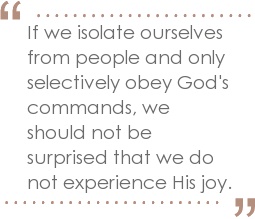Book Review - Doing Things Right in Matters of the Heart
[amazon 9781581348422 thumbnail]
You truly cannot judge a book by its cover or its title. In John Ensor’s book, Doing Things Right in Matters of the Heart, I would suggest that neither the cover nor the title do justice to this outstanding book. Neither does the title fully relay its critical contents. Based upon the title, I assumed that this book was another nouthetic counseling book about the heart. Instead, I found a profoundly well-written “heart surgery” book on the roles of men and women as it relates to real life, both before marriage and in marriage. In his book, Ensor declares that his objective “is to provide a winsomely radical alternative to the prevailing ideas, almost absolute doctrines, that guide our current thinking about manhood and womanhood and define our actions and expectations when pursuing matters of the heart.” (p. 15). In a footnote, he likens his book to a user-friendly, basic version of Recovering Biblical Manhood and Womanhood by Piper and Grudem (p. 20).
Ensor approaches this with a somewhat unique background of twenty five years of pastoral counseling, including twelve years as a pastor, and fifteen helping to establish pregnancy help centers in the Boston area, and at the time of publishing, he was helping to start five pregnancy centers in the neediest neighborhoods in Miami. Repeatedly he has seen the results of lives pursuing what the world demanded they pursue, only to come up empty-handed, hurt, diseased, ashamed, broken, and unfulfilled. He is not writing from theory. Ensor’s approach examines Scripture as it clashes with the heart of culture today from a firsthand experience.
In the first section of the book, Ensor attempts “to get to the heart of manhood and womanhood according to the Bible. What does it mean to be a man and not a woman? What is distinctively meaningful about being a woman and not a man? What marks the mature man? What does it mean to be, dare I say, a godly man? What marks the mature and godly woman and makes her attractive and fulfilled? How do we complement and fit together?” (p. 20-21) He offers that our culture’s “forced upon” solution to its underlying thirst is precisely opposite to what the Creator actually designed. Further, what the Creator designed is ultimately what the world craves after its solutions leave it broken and shattered.
 Reprinted with permission from Dan Miller’s book
Reprinted with permission from Dan Miller’s book  If you are a typical, suburban American, you ride a wooden horse on the “consumer carousel.” And on this economic joy-ride, there is a place where we grip the pole with our left hand and reach out with our right to grasp a brass ring. Then, as our painted horse proceeds in a lazy circle to the accompaniment of festive music, we get another chance to grab another ring. And on this particular ride, the rings get bigger and better with each pass.
If you are a typical, suburban American, you ride a wooden horse on the “consumer carousel.” And on this economic joy-ride, there is a place where we grip the pole with our left hand and reach out with our right to grasp a brass ring. Then, as our painted horse proceeds in a lazy circle to the accompaniment of festive music, we get another chance to grab another ring. And on this particular ride, the rings get bigger and better with each pass.
Discussion